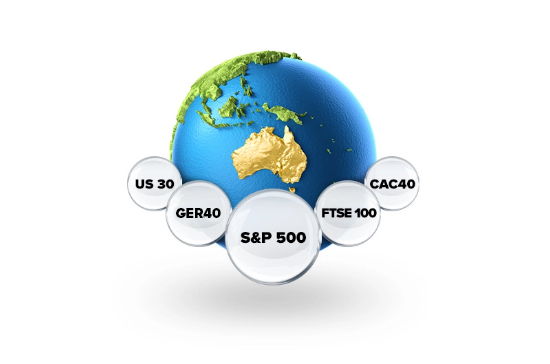What Is Index CFD?
Indices, plural of an index, refer to a basket of different assets that are a sector or entirety of a market, most often of the same country. Indices trading is a kind of shortcut for investors when investing in financial markets without having to invest in company stocks. It's also a way of reducing risk rather than buying and selling particular company shares. Investors who choose this way trade an index or compilation of shares.
An index is a list of publicly traded companies and their stock prices. Every index tracks a certain number of companies in the country. This means an index signs the total performance of a selected group of stocks. If the price of shares of the companies within the index increase, the value of the index also increases. If the price falls, the value of the index will go down.
By indices trading, traders directly interact with a segment of the market instead of shareholding in a single company. Trading indices allow traders to evade the possible high volatility of investing in a company by adding many other companies to the equation, thus justifying the potential impacts.
The most actively traded trading indices are often referred to as "Benchmark Indices" since they significantly impact global indices markets. Their stock indices are considered an indicator of economic growth and performance. The most active Benchmark Indices are:
- The FTSE 100: represents the UK's largest 100 companies and is mostly referred to as "the UK 100"
- Dow Jones: also known as "Wall Street," consists of the USA's 30 publicly-owned corporations.
- The DAX: consists of Germany's prime 40 companies and is also referred to as the "German 40."
- CAC40: more commonly called "France 40" and represents France's biggest capitalized 40 companies
- Nikkei 225: formed out of Japan's 225 price-wise leading companies, thus more often called "Japan 225"
- NASDAQ 100: is a capital-oriented index that comprises even more than 100 tech industry companies in the USA, therefore also referred to as "The US Tech 100."
Although every member of the index affects the index's performance, trading indices allow traders to engage in stock marketing at a macro-alike level and to benefit from market movements.
LEVERAGE
ASIC has imposed conditions on the issue and distribution of CFDs to retail clients. These conditions will be in place from 29 March 2021 to 29 September 2022, after which time they may be extended or made permanent.
From 29 March 2021, CFD leverage offered to retail clients will be restricted to a maximum ratio of:
- 30:1 for CFDs referencing an exchange rate for a major currency pair.
- 20:1 for CFDs referencing an exchange rate for a minor currency pair, gold, or a major stock market index.
- 10:1 for CFDs referencing a commodity (other than gold) or a minor stock market index.
- 2:1 for CFDs referencing crypto-assets.
- 5:1 for CFDs referencing shares or other assets.


